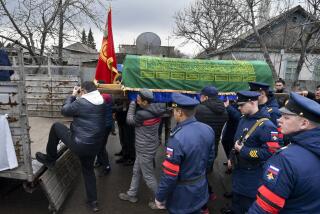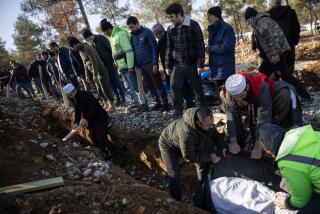Tensions Simmer as Kurds Reclaim Kirkuk
KIRKUK, Iraq â Surrounded by half-built housing developments, crowded tenements and congested roads, the tiny storefront office of Zakariya Real Estate is booming with business.
Maps of subdivisions hang like gridded wallpaper. Shelves display tile samples and colorful pictures of modular homes, priced to fit a range of budgets.
âSeventy percent of our clients are Kurds who were displaced by Saddam Hussein,â proprietor Zakariya Tahir Ali said in a recent interview. âNow they are coming back.â
As Kurds with means construct new houses, thousands of others who have returned to Kirkuk are demanding that their old houses be vacated by Arabs who moved there under Husseinâs ethnic policies, heightening tensions in one of Iraqâs most diverse cities.
The former Iraqi president forced about 250,000 Kurdish residents to give up their homes to Arabs in the 1970s, to âArabizeâ the city and the regionâs oil industry. U.S. and Iraqi officials estimate that nearly all those Kurds have returned to Kirkuk, capital of Al Tamim province, along with as many as 100,000 newcomers.
Kirkuk, with a population of about 1 million, has long been home to a mix of Kurds, Turkmens and Arabs, both Shiite and Sunni Muslims, and a smattering of Christians.
Last week, Turkmen leaders held discussions with Grand Ayatollah Ali Sistani, Iraqâs most influential Shiite leader, to push for greater representation in Kirkukâs government. But it is the majority Kurds who have taken the strongest action to claim the city as their own.
Iraqâs constitution outlines a process by which those who were illegally displaced by the Hussein regime would be compensated for confiscated property or resettled in their old homes. Under the plan, Arabs who relinquish Kurdish properties would also receive relocation funds. The resettlement programs would take place before a citywide census and 2007 referendum that will decide whether the oil-rich province should be annexed to the semiautonomous Kurdish region in Iraqâs north.
Kurdish families have filed thousands of claims with the Iraq Property Claims Commission, created to redress unjust land grabs by Husseinâs regime. One-third of 131,937 land claims filed since 2003 nationwide were filed in Kirkuk, according to commission figures.
Of those, about 2,500 claims have been settled, but there is still no effective legal mechanism to execute eviction orders on Arab occupants.
Thousands of Kurds have moved to Kirkuk to await adjudication of their claims, settling in bombed-out military facilities, squalid government office buildings and squatter camps throughout the city.
About half a mile from Aliâs real estate office is Kirkukâs soccer stadium, home to one of the cityâs largest displaced communities. During a recent visit, two families could be seen holding a slapdash wedding ceremony in the parking lot. Hundreds of others huddled in broken-down storage and changing rooms. Children scampered along the rafters.
The garbage-strewn stadium lacks running water and electricity and has occasionally been targeted by insurgentsâ rockets. During the winter, families forage for scrap wood and other refuse, which serve as cooking and heating fuel.
âMy family was driven out of Kirkuk during the former regime because we are Kurds,â said Ahmed Nori, 29, a refugee who said he was born in Kirkuk. âWe returned to Kirkuk after the regime fell and have lived here since then. Nobody cares about displaced people.... Weâve been living like this for three years. We are asking for lands and loans. Kurds have suffered enough, and they are still suffering.â
Ali opened his real estate office three years ago and says he has been doing brisk business. He says he has sold two-thirds of the 1,850 land parcels he started out with and is looking for more land to develop -- but real estate inside the city has become increasingly scarce. Ali says he competes with more than 500 real estate offices in Kirkuk.
âSome of the folks are coming back on their own, and some are being given some money by the Kurdish political parties to help them rebuild their homes,â said U.S. Army Col. David Gray, commander of the 1st Brigade, 101st Airborne Division, which operates in the Kirkuk area. âThere is also the charge that there is some squatting on government lands.â
Some beneficiaries of Husseinâs Arabization plan say Kurdish settlers are pressuring them to leave Kirkuk. But after as many as 30 years in the northern city, many Arab families have no place to go.
âWe have been here for the last 17 years,â said Shakir Mohammed, 28, an Arab merchant who lives with his family in one of several apartment complexes that were built for Arab settlers. Mohammed said that several Arab families at a group of apartment buildings that residents still called âSaddamâs Complexâ had been threatened by Kurdish residents.
âThatâs why a number of families were obliged to leave Kirkuk and go back to Baghdad and other southern provinces,â he said. âSaddam is the only one to blame for his own personal conduct. What is the guilt of the Arabs who came here just to have the benefit of a better house and a job?â
Mohammed Khalil Nasif, an Arab member of the provincial governorate council, said that Kurdish leaders had manipulated the refugee situation in the northern city.
âThe Kurds are bringing people in who have never lived here before,â he said. âAnd they stay in camps and government offices and say, âWe are oppressed.â â
Kurdish leaders say they are willing to negotiate resettlement costs for Kirkukâs Arab residents, but insist that most of them must leave. âKurds must return back to their homes, and Arabs must leave and go back to where they originally came from,â said Adnan Mufti, speaker of Kurdistanâs parliament.
Kurdish politicians regard Kirkuk as key to their sustained autonomy; to more militant Kurds, the city is a cornerstone of a future Kurdistan nation.
Al Tamim is one of Iraqâs most strategically important regions, producing 40% of the countryâs oil and 70% of its natural gas. Kurds have already demonstrated their impatience with Baghdad and the U.S.-led reconstruction effort by independently approving at least two oil exploration deals in Kurdistan.
âThe oil infrastructure up here is very, very important, not only to this region, but to Iraq itself,â Gray said during a recent media teleconference from Kirkuk. âAnd so the tensions over that, control of that and control of Kirkuk itself -- it has great symbolism and meaning to every one of the ethnic groups here.â
This month, a coalition of Arabs on Al Tamimâs governorate council, on which Kurds have a majority, announced that they were suspending their membership, âbecause of the continuous neglect of our peopleâs rights and its failure to respond to our official requests.â
The announcement came amid continuing allegations by Arab and Turkmen leaders that Kurdish forces were conducting a campaign of intimidation and illegal arrests to clear the city for Kurdish refugees.
âWe know that people are being arrested by Asayish, but we donât know where they take them,â said Tahsin Kahya, a Turkmen who is chair of the governorate council, referring to the Kurdish security agency. There have also been a number of retaliatory assassinations and kidnappings, U.S. officials said.
âAre there ethnically motivated killings? Yes, certainly those are happening across Kirkuk,â said an American official. âBut determining how widespread these killings are is a difficult thing, and trying to figure out exactly whoâs doing the killings is, at times, problematic.â
Kurdish, Turkmen, Arab and U.S. officials in Kirkuk have recently formed a body called the Committee for the Missing to identify, locate and secure the release of wrongful arrest victims.
Members of the committee have compiled a list of more than 100 âdisappearedâ people who are believed to have been arrested by Kurdish and U.S. forces. Most of those on the list appear to have Sunni Arab names.
A former Kurdish government official who said he had toured three secret prisons in Kurdistan over the last two years described rows of solitary confinement cells where prisoners are held behind iron doors without light or toilets. The former official, who asked not to be identified for fear of government reprisals, also described torture tactics used by interrogators.
âThey interrogate by torturing, using things like shocking prisoners with electricity or burning them with hot irons, sodomizing them with bottles,â the former official said. âOr they oblige them to stay in the sun for a whole day and in the cold they expose them to the elements.â
More to Read
Sign up for Essential California
The most important California stories and recommendations in your inbox every morning.
You may occasionally receive promotional content from the Los Angeles Times.










